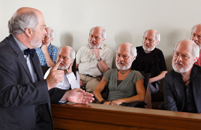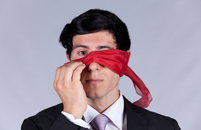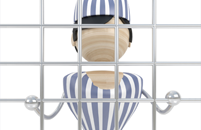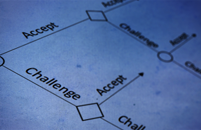Articles by Category
Articles by Issue
Recent Comments
- Stephen Brodsky on Harming Children: Uncovering and Overcoming Bias When Defending Sex Crimes Against Children
- Laura on Courtroom Attire: Ensuring Witness Attire Makes the Right Statement
- Members selection — Court-Martial Trial Practice Blog — February 22, 2014 on Why Do We Ask Jurors To Promise That They Will Do the Impossible?
- Video: Pryor Greed and Lawyers | Parents Rights Blog on Ethical Issues in Racial Profiling
- On the relationship between ideological and demographic diversity on Inaccuracy in Political Self-Perception: Young Adults Are Not as Conservative as They Believe
- Taylor Bishop on Tips for Preparing the Expert Witness
- Thanks for stopping by…. « The Jury Room on Book Review- Social Media as Evidence: Cases, Practice Pointers, and Techniques
- Thanks for stopping by…. « The Jury Room on Book Review: The Juror Factor: Race and Gender in America’s Civil Courts
Vol. 26 No. 3 August 2014 Archive
-
Demographic Roulette: What Was Once a Bad Idea Has Gotten Worse
by Douglas L. Keene, Ph.D. and Rita R. Handrich, Ph.D.Posted on August 20, 2014 | 9 CommentsAuthored by Doug Keene and Rita Handrich with a response from Paul Begala, this article takes a look at how the country has changed over the past 2 decades and our old definitions of Democrat or Republican and conservative or liberal are simply no longer useful. What does that mean for voir dire? What should it mean for voir dire? Two very good questions those. -
If It Feels Bad to Me, It’s Wrong for You: The Role of Emotions in Evaluating Harmful Acts
by Ivar Hannikainen, Ph.D. and Ryan Miller and Fiery Cushman, Ph.D.Posted on August 20, 2014 | No CommentsAuthored by Ivar Hannikainen, Ryan Miller and Fiery Cushman with responses from Ken Broda-Bahm and Alison Bennett, this article has a lesson for us all. It isn’t what that terrible, awful defendant did that makes me want to punish, it’s how I think I would feel if I did that sort of terrible, horrible awful thing. That’s what makes me want to punish you. It’s an interesting perspective when we consider what makes jurors determine lesser or greater punishment. -
Neuroimagery and the Jury
by Jillian M. Ware and Jessica L. Jones and N.J. Schweitzer, Ph.D.Posted on August 20, 2014 | 2 CommentsAuthored by Jillian M. Ware, Jessica L. Jones, and Nick Schweitzer with responses from Ekaterina Pivovarova and Stanley L. Brodsky, Adam Shniderman, and Ron Bullis. Remember how fearful everyone was about the CSI Effect when the research on the ‘pretty pictures’ of neuroimagery came out? In the past few years, several pieces of research have sought to replicate and extend the early findings. These studies, however, failed to find support for the idea that neuroimages unduly influence jurors. This overview catches us up on the literature with provocative ideas as to where neurolaw is now. -
Predicting Jurors’ Verdict Preference from Behavioral Mimicry
by Matthew Groebe, Ph.D. and Garold Stasser, Ph.D. and Kevin-Khristián Cosgriff-Hernandez, M.A.Posted on August 20, 2014 | 13 CommentsAuthored by Matthew Groebe, Garold Stasser, and Kevin-Khristián Cosgriff-Hernandez, this paper gives insight into how jurors may be leaning in support of one side or the other at various points during the trial. This is a project completed using data from actual mock trials (and not the ubiquitous undergraduate). -
Favorite Thing: Mind Map
by Brian PattersonPosted on August 20, 2014 | 1 CommentWhat works best when organizing thoughts and tasks? Free association or maintaining order? Our Favorite Thing gives you the best of both worlds. -
The Ubiquitous Practice of “Prehabilitation” Leads Prospective Jurors to Conceal Their Biases
by Mykol C. Hamilton, Ph.D. and Emily Lindon, B.S. and Madeline Pitt, B.S. and Emily K. Robbins, B.S.Posted on August 20, 2014 | 13 CommentsAuthored by Mykol C. Hamilton, Emily Lindon, Madeline Pitt, and Emily K. Robbins, with responses from Charli Morris and Diane Wiley, this article looks at how to not “prehabilitate” your jurors and offers ideas about alternate ways of asking the question rather than the tired, old “can you be fair and unbiased?”. -
Novel Defenses in the Courtroom
by Shelby Forsythe and Monica K. Miller, J.D., Ph.D.Posted on August 20, 2014 | 1 CommentAuthored by Shelby Forsythe and Monica K. Miller, with a response from Richard Gabriel. This article examines the reactions of research participants to a number of novel defenses (Amnesia, Post-Traumatic Stress Disorder (PTSD), Battered Women Syndrome (BWS), Multiple Personality Disorder (MPD), Post-Partum Depression (PPD), and Gay Panic Defense) and makes recommendations on how (as well as whether or not) to use these defenses. -
On The Application of Game Theory in Jury Selection
by David Caditz, Ph.D.Posted on August 20, 2014 | 2 CommentsAuthored by David M. Caditz with responses from Roy Futterman and Edward Schwartz. Suppose there was a more predictable, accurate and efficient way of exercising your peremptory strikes? Like using a computer model based on game theory? In this article, a physicist presents his thoughts on making those final decisions more logical and rational and based on the moves opposing counsel is likely to make. -
New political labels, a new word (prehabilitation) and new ways to think about many things
by Rita R. Handrich, Ph.D.Posted on August 20, 2014 | No CommentsAs we reach the dog days of summer and triple digit temperatures (and humidity pushing triple digits in some parts of the country), it’s a perfect time to sit in air-conditioned comfort with an adult beverage and ponder the plethora of possibilities in this penultimate Jury Expert issue for 2014. […]








![New political labels, a new word (prehabilitation) and new ways to think about many things As we reach the dog days of summer and triple digit temperatures (and humidity pushing triple digits in some parts of the country), it’s a perfect time to sit in air-conditioned comfort with an adult beverage and ponder the plethora of possibilities in this penultimate Jury Expert issue for 2014. […]](https://thejuryexpert.com/wp-content/uploads/Editor_thumb1.png)